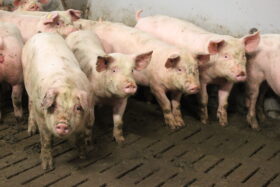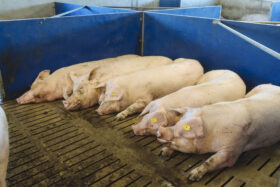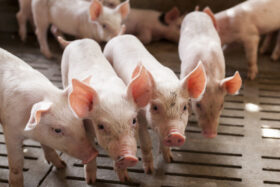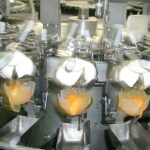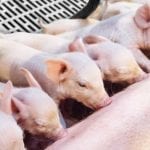Conference Report
Unlike humans and most mammals, piglets do not receive any maternal immunoglobulins (antibodies) via the placenta. Therefore, it is vital for piglets to receive maternal antibodies via the colostrum within 24 hours of birth. Otherwise, they are more vulnerable to illnesses in their early stages of life. In situations where piglets do not receive enough colostrum, such as due to large litter sizes or weak sows following a prolonged farrowing — supplemental colostrum or IgY products can provide essential immune protection.
In the following, Dr. Shofiqur Rahman describes the innovative role of IgY – yolk immunoglobulins in enhancing swine health.
IgY – modes of action
IgY is an antibody found in egg yolk. It is an entirely natural product; each egg contains approximately 100 mg of IgY. These egg-derived antibodies primarily function in the gut through several mechanisms:
- Adherence inhibition – IgY antibodies bind to specific structures on the surface of pathogens (such as fimbriae, flagella, and lipopolysaccharides), preventing them from adhering to the intestinal mucosa and blocking the initial stages of infection. This is particularly significant for enterotoxigenic E. coli (ETEC), which causes piglet diarrhea by attaching to intestinal cells.
- Neutralization – IgY can neutralize toxins produced by pathogens, preventing them from exerting harmful effects on host cells.
- Agglutination – IgY promotes the clumping of pathogens by binding them together, effectively immobilizing them, and facilitating their removal from the animal’s gut.
- Cell damage – IgY can damage the integrity of bacterial cell walls leading to cell lysis and reduced bacterial viability.
Furthermore, because these pathogens are bound in complexes with IgY and eliminated through feces in an inactivated form, IgY helps prevent environmental re-infection through manure.
IgY and IgG – functional differences
Both IgY and Immunoglobulin G (IgG) (IgG, the most abundant immunoglobulin in mammals) are antibodies. They, however, exhibit significant differences due to their distinct structural characteristics. “IgY, for instance, does not activate the complement system, a key function of IgG that enhances immune responses against infections. Additionally, IgY promotes more rapid phagocytosis and reduces inflammation compared to IgG. These effects contribute to energy conservation, thereby facilitating improved animal growth performance,” he explained.
IgY is more hydrophobic than IgG, which increases its stability and resistance to proteolytic degradation. This property is beneficial for maintaining its functionality in the gastrointestinal tract.
Production and quality control
IgY develops in hens in response to the pathogens they encounter, regardless of their relevance to the hens themselves. For instance, hens immunized with an infectious pathogen affecting pigs can produce IgY, effectively preventing the disease caused by that pathogen.
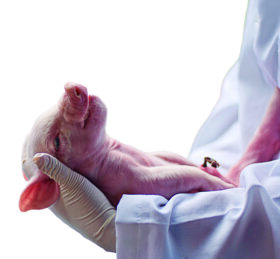
There are different methods of IgY production. One possibility is to hyperimmunize the hens simultaneously with multiple antigens. This method seems convenient, but it does not produce products with standardized levels of immunoglobulins for each antigen.
Another approach involves immunizing different groups of hens, each with a single antigen (e.g., transmissible gastroenteritis virus, rotavirus, E. coli) that commonly challenges piglets during the first weeks of life. The immunoglobulin content is then quantified, and the resulting egg powders are spray-dried, pasteurized, and mixed. This process yields an IgY product with standardized amounts of specific immunoglobulins that exhibit high affinity for the target pathogens.
One health application in swine
“The benefits of IgY have been demonstrated through extensive trials and commercial experiences, highlighting its potential for various applications not only in swine but also in other animals and humans,” said Dr. Rahman.
Due to concerns about antibiotic resistance, regulatory and consumer scrutiny increased over the use of in-feed antibiotics. IgY can serve as an effective and natural alternative for improving overall gut health, reducing the incidence and severity of diarrhea, reducing morbidity during the critical pre- and post-weaning periods, and, thereby, increasing performance.
Unlike antibiotics, which can indiscriminately kill both harmful and beneficial bacteria, IgY selectively targets specific pathogens. This selective action helps maintain a balanced gut microbiome, which is crucial for overall health and digestion in piglets. Disruption of the gut microbiota by antibiotics can lead to issues such as antibiotic-associated diarrhea and increased susceptibility to opportunistic infections due to the loss of beneficial microbes.
In contrast to antibiotics, IgY targets multiple antigenic sites on pathogens, requiring various genes for their protection, thereby avoiding resistance issues among pathogenic microorganisms. Additionally, IgY is effective not only against bacteria but also demonstrates significant efficacy against viruses and coccidia.
Conclusion
Dr. Rahman concluded that “the use of IgY as a passive immunization strategy, incorporated into a holistic approach to reducing piglet diarrhea, offers a safe and natural alternative to traditional antibiotics, particularly in the light of rising antibiotic resistance and the need for effective treatments also for viral diseases.”
EW Nutrition’s Swine Academy took place in Ho Chi Minh City and Bangkok in October 2024. Dr. Shofiqur Rahman, Senior Researcher at the Immunology Research Institute Gifu (IRIG) in Japan was one of the highly experienced speakers of EW Nutrition. Originally a microbiologist, Dr. Rahman focuses on researching and developing IgY products for Human, Animal, Pet, Fish, Plant, and Environmental health.
